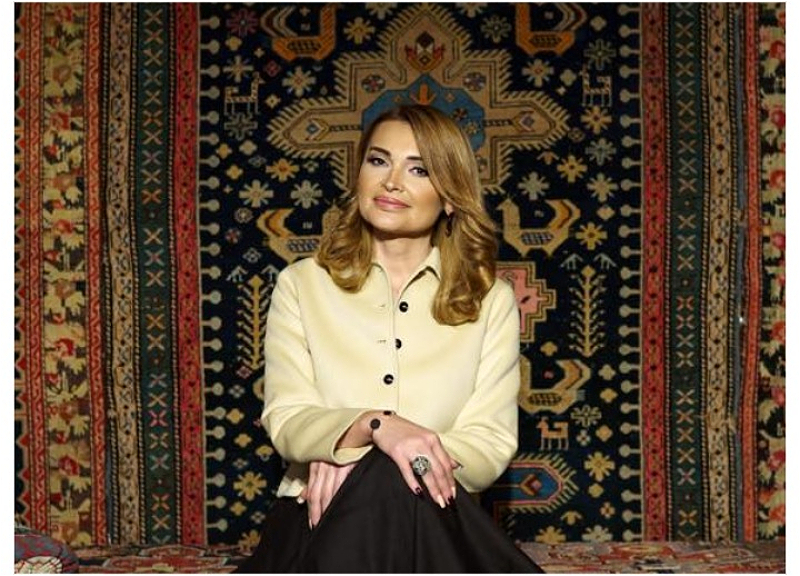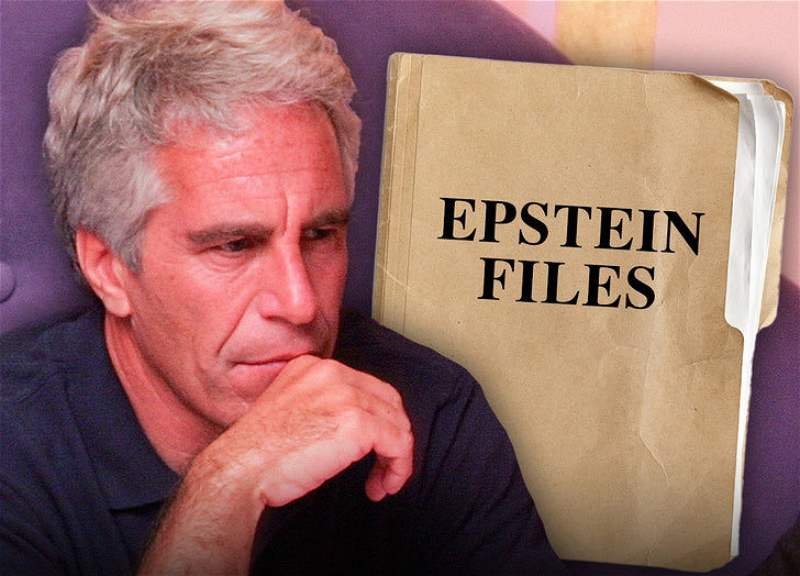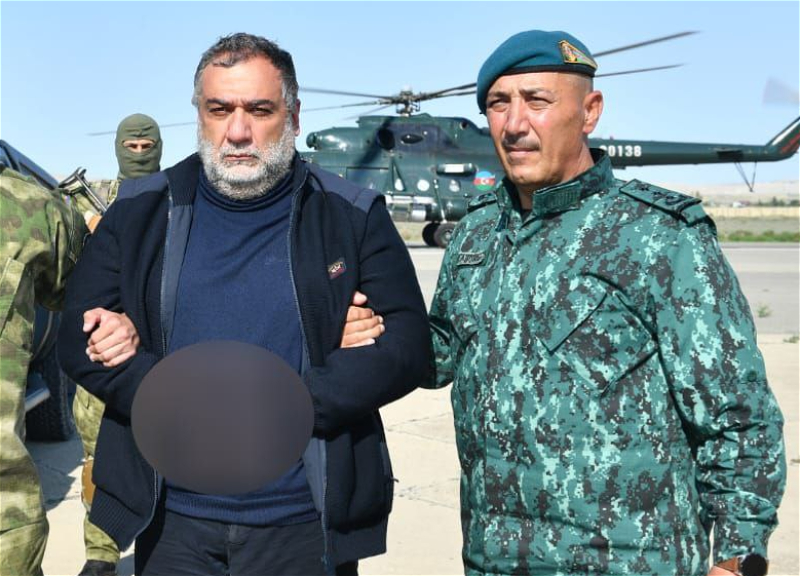The First Azerbaijan International Investment Forum: Baku Opens the Door to the Economy of Tomorrow

Azerbaijan’s reputation as a reliable and predictable partner has long made it one of the most attractive destinations for foreign capital, reinforcing international confidence among international actors in the stability and potential of its national development model.
A steady inflow of investment has both strengthened Azerbaijan’s economic position and opened new opportunities for sustainable growth and long-term gains for investors.
In this context, the First Azerbaijan International Investment Forum in Baku serves as a key element of the country’s economic strategy. It provides a platform for deepening mutually beneficial cooperation, building new partnerships, discussing advanced ideas and projects, and attracting new investments.
President Ilham Aliyev, underscoring the significance of the forum, described it as the beginning of a new stage of cooperation and investment. “Our main goal is the implementation of innovative business ideas and the expansion of favorable opportunities for business. I invite all of you to invest your capital, technologies, and ideas in Azerbaijan. I am confident that the realization of your ideas and initiatives in the form of real projects in Azerbaijan will create a solid foundation for successful cooperation and shared prosperity,” the head of state said in his address to participants of the Forum.
A tangible response to this call came swiftly: during the plenary session, “Azerbaijan and Beyond: Coordinating Regions, Building the Future,” attended by Azerbaijan’s Deputy Prime Minister Samir Sharifov and the UAE’s Minister of Investment, Mohammed bin Hassan Al-Suwaidi, the Ministry of Economy of Azerbaijan signed a cooperation agreement with the Emirati company Modon Holding on developing the “City within a City” concept.
The project, with planned investments of up to $5 billion, envisions creating a modern waterfront district around Lake Boyukshor.
“This multi-billion-dollar initiative provides for the development of a modern coastal area around Lake Boyukshor, integrating healthcare, commercial, educational, and hospitality facilities. It will be a flagship project in sustainable urban development,” Azerbaijan’s Minister of Economy Mikayil Jabbarov wrote on his social media account.
At the 1st #Azerbaijan International #Investment Forum, in the presence of Samir Sharifov, Deputy Prime Minister of the Republic of Azerbaijan, and Mohammed Hassan Al Suwaidi, Minister of Investment of the United Arab Emirates (@Inv_UAE), a cooperation agreement was signed with… pic.twitter.com/9MSRcQmvI6 — Mikayil Jabbarov (@MikayilJabbarov) September 22, 2025
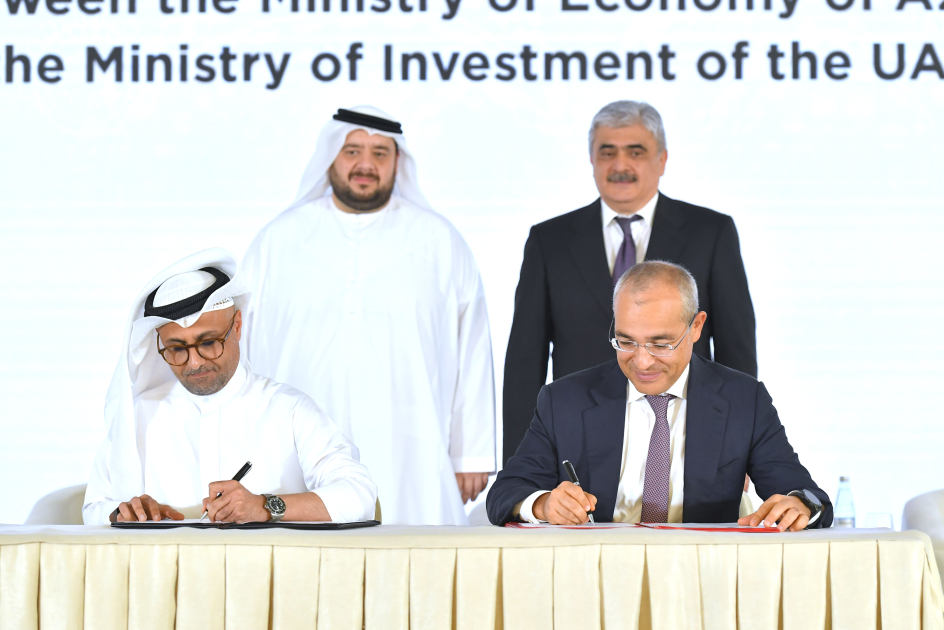
The Forum also saw the signing of several agreements related to a seawater desalination project in Azerbaijan:
- A public-private partnership agreement on designing, constructing, financing, and operating a desalination plant was signed by Chairman of Azerbaijan’s State Water Resources Agency Zaur Mikayilov and ACWA Power CEO Marco Arcelli.
- An Agreement on the Purchase of Purified Water was signed by the head of the “United Water Supply Service of Large Cities” public legal entity, Tair Khalilov, and Marco Arcelli.
- An Agreement on the Provision of a State Guarantee was signed by Minister of Finance Sahil Babayev and Marco Arcelli.
- A land lease agreement was signed by Minister of Economy Mikayil Jabbarov, Chairman of the Agency for the Development of Economic Zones Seymur Adigozalov, and Marco Arcelli.
This desalination initiative is Azerbaijan’s first pilot project under a public-private partnership. The plant, to be built in the Sumgayit Industrial Park, will produce drinking water by desalinating seawater. With a daily capacity of 300,000 cubic meters, the $407 million project will be designed, built, and operated by ACWA Power for 25 years.
The project aims to meet rising demand for drinking water on the Absheron Peninsula and diversify sources of fresh water. Additional goals include reducing the state’s burden in supplying drinking water, fostering technology transfer, and attracting foreign investment.
Jabbarov noted that the project involves over $400 million in direct foreign investment. “Its implementation will bring modern and efficient solutions for managing water resources in Azerbaijan, foster technology transfer, and advance public-private partnership,” he said.
As part of the 1st #Azerbaijan International Investment Forum, with the participation of Samir Sharifov, Deputy Prime Minister of the Republic of Azerbaijan, we attended the signing ceremony of documents with "ACWA Power" (@acwapower_en) for the construction of a seawater… pic.twitter.com/s1QtNJTl7n — Mikayil Jabbarov (@MikayilJabbarov) September 22, 2025
Brotherly Turkey, Azerbaijan’s close partner, also played an active role at the Forum.
“Deepening Azerbaijani-Turkish economic cooperation and implementing joint projects in e-commerce are of special importance,” Jabbarov wrote after meeting with Trendyol Group President Chetin Caglayan. “Our discussions focused on opportunities in expanding e-commerce, introducing advanced digital solutions, and strengthening logistics infrastructure—areas that will enhance connectivity, innovation, and trade between our countries.”
Deepening #Azerbaijan–#Türkiye #economic cooperation and implementing joint projects in the field of e-commerce hold particular importance. Within the framework of the 1st Azerbaijan International #Investment Forum in Baku, we held a meeting with Çetin Çağlayan, President of… pic.twitter.com/NBMHW4gKPA — Mikayil Jabbarov (@MikayilJabbarov) September 22, 2025
The Forum brought together representatives of leading international financial institutions, think tanks, global investment and business organizations—further confirming Azerbaijan’s growing role in the global economy. Discussions centered on the country’s strategic location, economic diversification, openness to innovation, contributions to regional cooperation, and adaptability to rapidly changing geoeconomic realities.
Aliyev’s address to participants once again highlighted Azerbaijan’s ambition: “Azerbaijan consistently supports creative initiatives and projects that provide entrepreneurs with profitable opportunities. I believe our partners, by taking advantage of Azerbaijan’s favorable conditions, can make a significant contribution to our sustainable development, technological progress, and the prosperity of the wider region.”
The agreements signed at the Forum were well received by international financial and economic institutions.
World Bank Regional Director Roland Price stated: “The World Bank supports Azerbaijan’s initiatives in developing the Middle Corridor and laying undersea power cables across the Caspian and Black Seas. Alongside ensuring its own sustainable growth, Azerbaijan plays an important role in the region’s development.”
Nouriel Roubini, CEO of Roubini Macro Associates and professor at New York University, emphasized Azerbaijan’s role in renewable energy investment: “Azerbaijan continues to play a significant role in addressing global challenges. The country is successfully shifting to green energy to tackle environmental issues. Its geography and climate create great opportunities for producing renewable energy. Azerbaijan meets its own energy needs, exports surplus energy, and contributes to tackling global environmental challenges. In the future, Azerbaijan will become more developed and more effective in responding to global issues.”
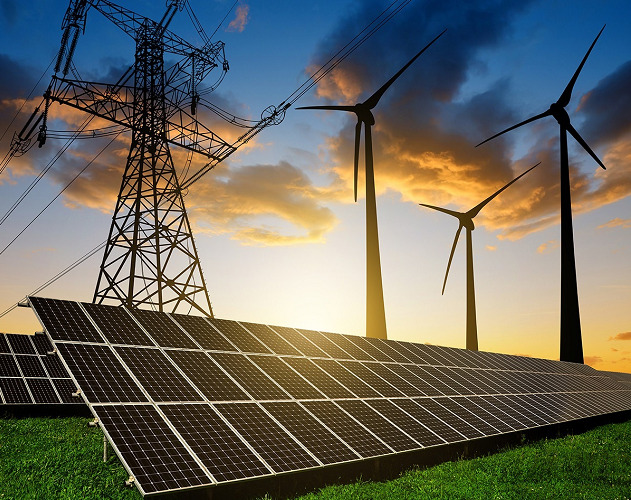
Vice Prime Minister Samir Sharifov underlined the foundations of Azerbaijan’s success: “Significant investments in energy, transport, and digital infrastructure, along with macroeconomic stability, a solid financial base, and a favorable business climate, all strengthen Azerbaijan’s position. The World Bank’s Business Ready survey and international rating agencies confirm this. Fitch and Moody’s have both upgraded Azerbaijan’s rating to investment grade.”
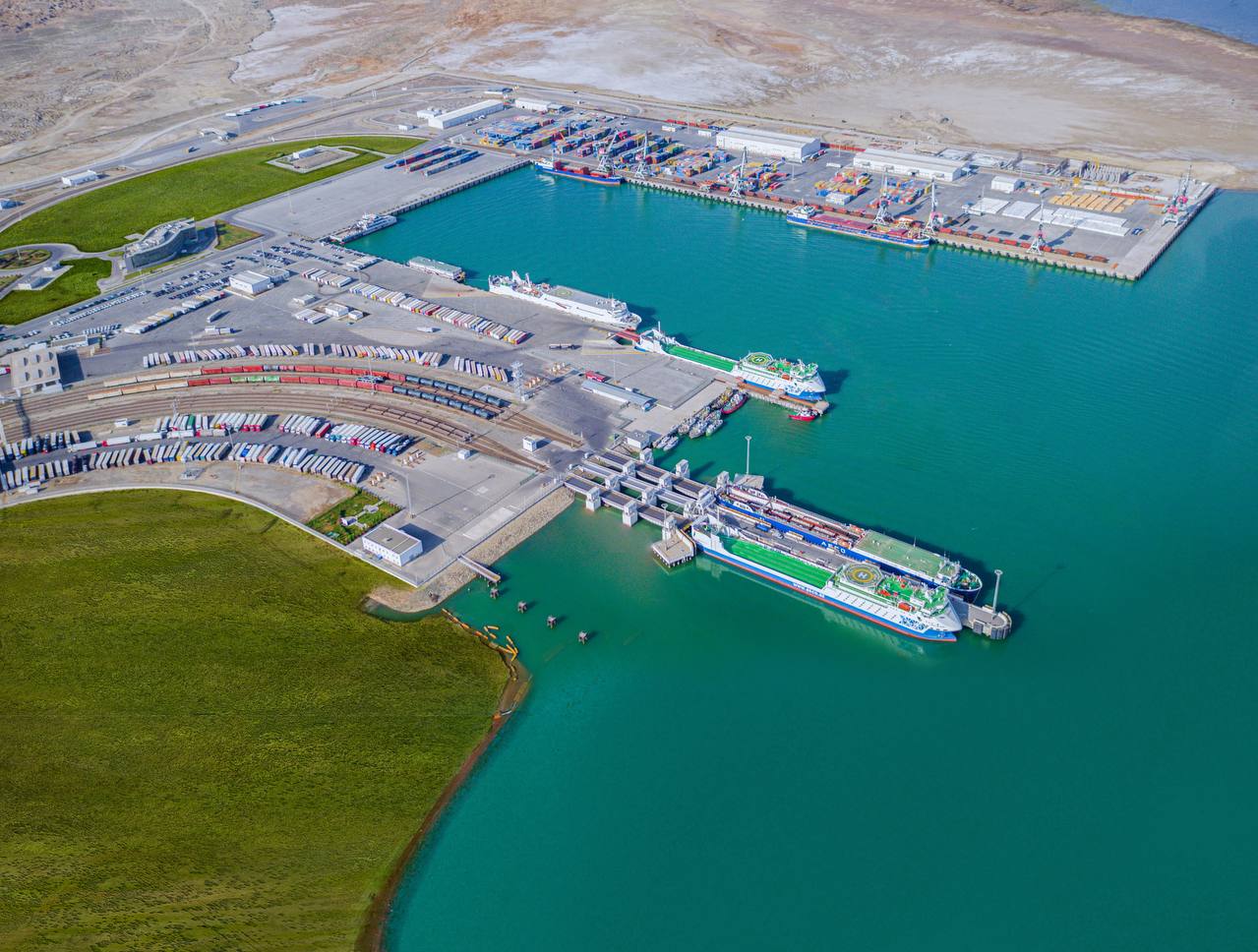
These achievements reflect a deliberate and long-term economic strategy. Aliyev noted: “Between 2004 and 2024, $344.4 billion was invested in Azerbaijan’s economy, of which $213.2 billion went into the non-oil sector. This is clear evidence of foreign investors’ trust in Azerbaijan and the atmosphere of stability and security in our country.”
Thousands of companies with foreign capital now operate in Azerbaijan. “This significantly contributes to building a competitive and sustainable economy based on modern corporate governance. Most foreign companies reinvest their profits in Azerbaijan,” Aliyev stressed.
He added that economic growth has become a long-term sustainable trend: non-oil sector growth averaged 6.7% annually from 2021 to 2024, raising its share of the economy to 68%. Non-oil exports nearly doubled in six years. Modern industrial infrastructure underpins this progress: nine industrial parks and four industrial zones host 171 enterprises, 98 of which are already operational. Total investment in these zones exceeds 6.9 billion manats, generating nearly 11,000 permanent jobs.
Through advanced reforms and public-private partnerships, the private sector’s share in the economy remains at 81.4%. Sustainable growth has increased national prosperity and state financial strength: by 2025, budget revenues will have risen 2.4 times since 2017, foreign exchange reserves nearly doubled, and external debt dropped to just 6.5% of GDP—among the lowest ratios in the world.
Aliyev also emphasized the growing role of economic diplomacy in Azerbaijan’s foreign policy, especially in developing non-oil sectors such as tourism.
Azerbaijan’s geography, he said, makes it a strategic hub of regional economic policy. Transit volumes along the Middle Corridor are increasing annually and will grow further with the opening of the Zangezur Corridor. Modern infrastructure—including the Baku International Sea Trade Port, Alat Free Economic Zone, and upgraded railway networks—offers investors direct access to global markets and efficient transit opportunities. Special economic zones, ready-made platforms in modern transport and digital infrastructure create opportunities for manufacturing, logistics, renewable energy, digital services, and agriculture.
Energy policy is central to Azerbaijan’s international economic standing. “Azerbaijan is a strategic partner in both traditional and renewable energy. Alongside natural gas, projects in solar and wind power, the green energy zones of Karabakh and Eastern Zangezur, and smart infrastructure initiatives make our country a leading player in the global energy transition. This ensures today’s energy security while building tomorrow’s green economy.”
Success in traditional energy is now complemented by digital and technological transformation. “Expanding cloud technologies, developing digital infrastructure, and integrating innovation into key sectors will strengthen Azerbaijan’s position as a future strategic hub in high technology and artificial intelligence,” Aliyev stated.
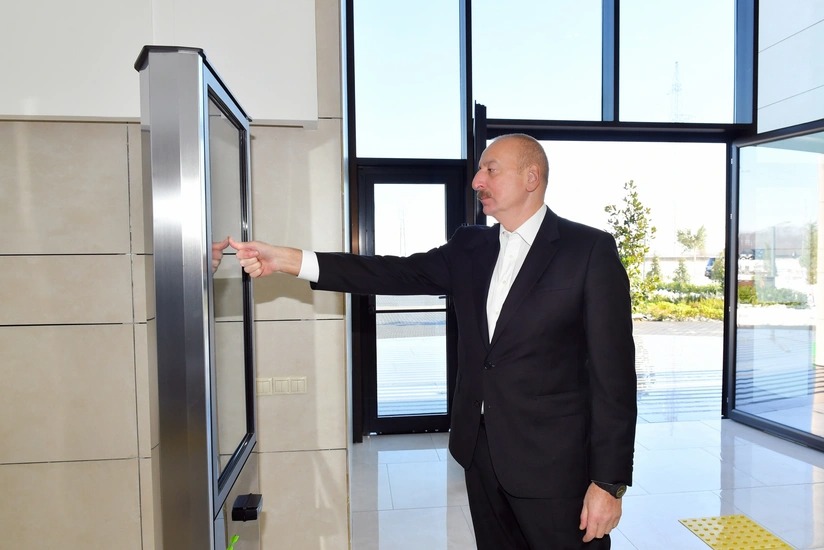
The First Azerbaijan International Investment Forum thus confirms the country’s role as a major regional hub for capital and innovation.
It demonstrates Azerbaijan’s capacity to forge new alliances, deploy advanced technologies, and establish the conditions for long-term sustainable growth. At the same time, it provides an effective platform for synergy between state initiatives and private capital, opening opportunities for joint projects and enhancing competitiveness.
In this way, Azerbaijan—reliable partner, center of economic dynamism and progress in the region—is opening the doors to the economy of tomorrow, creating new opportunities for investment, innovation, and sustainable development.
F. Baghirova
